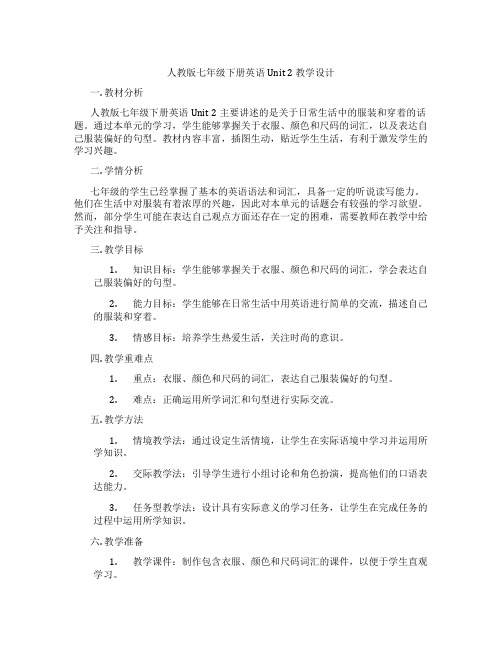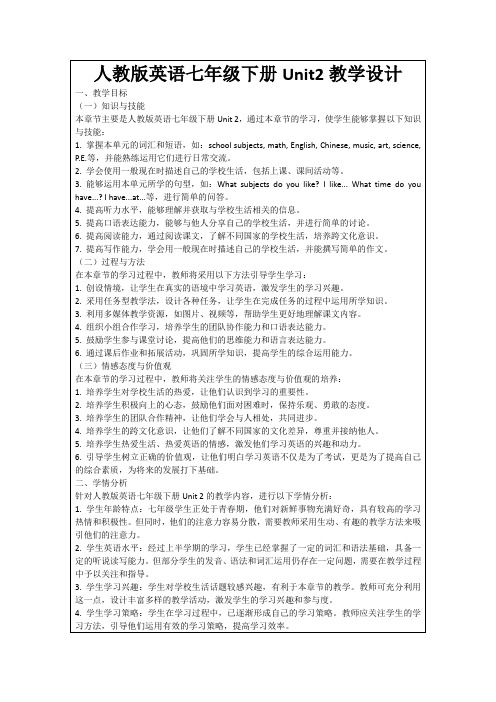(完整)新版-人教版七年级英语下册第二单元教案
- 格式:doc
- 大小:52.52 KB
- 文档页数:5

人教版七年级下册英语Unit 2 教学设计一. 教材分析人教版七年级下册英语Unit 2主要讲述的是关于日常生活中的服装和穿着的话题。
通过本单元的学习,学生能够掌握关于衣服、颜色和尺码的词汇,以及表达自己服装偏好的句型。
教材内容丰富,插图生动,贴近学生生活,有利于激发学生的学习兴趣。
二. 学情分析七年级的学生已经掌握了基本的英语语法和词汇,具备一定的听说读写能力。
他们在生活中对服装有着浓厚的兴趣,因此对本单元的话题会有较强的学习欲望。
然而,部分学生可能在表达自己观点方面还存在一定的困难,需要教师在教学中给予关注和指导。
三. 教学目标1.知识目标:学生能够掌握关于衣服、颜色和尺码的词汇,学会表达自己服装偏好的句型。
2.能力目标:学生能够在日常生活中用英语进行简单的交流,描述自己的服装和穿着。
3.情感目标:培养学生热爱生活,关注时尚的意识。
四. 教学重难点1.重点:衣服、颜色和尺码的词汇,表达自己服装偏好的句型。
2.难点:正确运用所学词汇和句型进行实际交流。
五. 教学方法1.情境教学法:通过设定生活情境,让学生在实际语境中学习并运用所学知识。
2.交际教学法:引导学生进行小组讨论和角色扮演,提高他们的口语表达能力。
3.任务型教学法:设计具有实际意义的学习任务,让学生在完成任务的过程中运用所学知识。
六. 教学准备1.教学课件:制作包含衣服、颜色和尺码词汇的课件,以便于学生直观学习。
2.练习题:准备相应的练习题,用于巩固所学知识。
3.教学道具:准备一些衣物道具,方便学生在课堂上进行展示和交流。
七. 教学过程1.导入(5分钟)利用多媒体展示一些时尚杂志封面,引导学生关注服装话题,激发学习兴趣。
2.呈现(10分钟)教师展示课件,呈现本节课的主要词汇和句型,如“T-shirt”、“trousers”、“blue”等,并解释其含义和用法。
3.操练(15分钟)学生分组进行角色扮演,运用所学词汇和句型进行对话,教师巡回指导并纠正错误。

人教版英语七年级下册教课设计: Unit2 What time do you go to ? SectionB( 3a-Self Check)教课设计Unit2 SectionB ( 3a-Self Check)教课设计1.0 Teaching analysis 教情解析1.1 Teaching objectives 教课目的1.1.1 Language goals 语言目标1.1.1.1 Key Words and Chunks1.1.1.1.1 For applying: life1.1.1.1.2 For comprehending:1.1.1.2 Sentence Structures1)I usually exercise from six fifteen to seven.2)I have a very healthy life.3)You need to brush your teeth after eating to have good teeth.4)I don’ t have time to cleanmy room from Monday to Friday. So I clean iton weekends.5)Because she always makes breakfast for me.6)I don ’ t know. But ishenever late for the first class in the morning.1.1.1.3 Grammar Focus1)You need to brush your teeth after eating to have good teeth. (need在句中作实意动词,意为“需要”,构造为 need to do sth; after 在句中作介词,意为“在 ...后”,后接动词要用 -ing 形式 )2) Because she always makes breakfast for me. (make在句中作动词,意为“做饭” , 为谁做饭用 for )1.1.2 Ability goals能力目标1.1.2.1 指引学生全面阅读性复习,总结概括全部学过的相关平时生活及作息习惯的词汇和语言构造。


七年级英语下册第二单元教案(新人教版)Do you go to school?难点讲评1.What time do you get up?What time +助动词do/does +主语+动词原形,询问某人做某事的具体时间。
what time do you begin class in the morning?注:What’s the time=What time is it?也是用来询问时间,意为“几点了”。
用it作答。
What’s the time? It’s 7:30.2.I us ually get up at five o’clock.1)句中usually与often 一样都是频度副词,常用于动词be 之后,行为动词之前。
always 意思是“总是”、“永远”,表示动作重复,状态继续,中间没有间断。
We always get up before six o'clock.He is always thinking of others.always>usually>often>sometimes>seldom>never2)介词at 常用于具体时刻之前,意义为在……,如:at 5:00 在5:00钟。
介词at 除了指时间以外,还可指(1)人物的所在之处,如:at my uncle’s home 在我姑姑家, at the station 在火车站.(2)朝向,如:look at me!看我!(3)指速度或价格.如:she buys the book at a good price 她以优惠的价格买了这本书。
on,at,in这三个常用介词都可以表示时间和地点,但具体用法不同.①on用在日期、星期几、节日前,也表示在具体某一天及具体某一天的上午、下午和晚上。
on November 1st on Monday on Children’s Day on Tuesday evening②in用于月份、季节、年份前,当early,late用于句首修饰介词短语时,尽管表示具体某一天的上午、下午、晚上,都要用in,泛指一般的上、下午,晚上也用in 。

Unit 2 What time do you go to school?Section A (1a-2d)一、教学目:1.言知目:1) 能掌握以下:up, get up, dress, get dressed, brush, tooth (pl. teeth) brush teeth, shower, take a shower, usually, forty, fifty, wow, never, early, job, work, station, radio station,o'clock, funny, exercise能掌握以下句型:①— What time do you usually get up?—I usually get up at six thirty.②— When do you go to work?—I usually go to work at eleven o'clock.③— He has an interesting job.—He works at a radio station.2)用 when 和 what time 引的特殊疑句和的表达法;用所学的目言生活和学活做划,学会合理地安排作息。
二、教学重点1.教学重点:1)掌握的表达方式。
2)学和和制作息表。
2.教学点:when 和 what time 引的特殊疑句和的表达法。
三、教学程Ⅰ. Warming-up and revision1.Greet the Ss as usual.2.Watch a short video program about daily activities.Ⅱ. Presentation1.出示几幅反映日常事 (如:起床、上学、跑步等 )的画、幻灯片或播放件,引学生些日常事 go to school,get up,run,take a shower,eat breakfast等,学有关的短。

七下英语人教版第二单元教案设计全文共3篇示例,供读者参考七下英语人教版第二单元教案设计11、能听懂会说what d u d n saturdas/sundas? i ften d hewr, read bs and watch tv.lessn 6 教学目标:1、能理解认读read and write 部分的对话,并能在情景中运用;2、听说读写read and write中的四会句子,并根据对话内容完成句子填空练习;3、能够完成let’s chec部分对本单元学习进行阶段性评价。
教具准备:教学光盘、单词卡片。
教学重点:本课时的重点是四会掌握句子:what d u d n saturdas? i watch tv n saturdas. what abut u? i d hewr。
教学难点:本课时的难点是将动作和星期几在一个句子中表达,如i watch tv n saturdas. 并能进行词组和单词的灵活应用,以及句中的大小写书写规范。
教学过程:step 1. waring up(l)汇报周末活动把课后收集到的周末活动进行整理,使用句型:“what d u d n weeends?i….”在班级内汇报,找出学生们最喜欢的周末活动。
(2)日常口语练习,内容可参考如下:a:what da is it tda?b:it's mnda.c:what d u have n mndas?b:i have ath…i dn't lie mndas.i lve sundas.a:what d u d n sundas?step2. presentatin(1)教师呈现教材图片,让学生说出表现z周六活动的三张小图代表哪三个动词短语。
并试着按照z的喜爱程度排序。
教师再问学生:what des aunt cath d n saturdas?请学生阅读对话后回答。
(2)看挂图或,听录音跟读对话,注意理解和体会上下文的意思,然后填充表格。
Unit 2 What time do you go to school ?一.考点,热点回顾【重点单词】time get shower usually o'clock work hour brush teeth after hotel all night love listen home job am homework letter around start write tell soon best wish survey awake【重点短语】what time go to school get up take a shower go to workdo homework go home【重点句子】1.What time do you usually get up ? I usually get up at five o'clock.2.What time does Alice take a shower ? She usually takes a shower at 9:003.What a funny time to eat breakfast.4.To get to work, he takes the number 17 bus to t hotel.5.Can you think what his job is ?6.What time is it ? I t's eight thirty.【重点语法】----询问“时间”的特殊疑问句What time 用来提问“几点几分”,有时候可以用when代替构成如下:1.询问时间--what time is it now ?---It's five o'clock.2.询问某人在几点做某事What time do / does + 主语+ 实义动词原形+ 其他---What time do they go to school ?---They go to school at 7 o'clock.如何写有关谈论日常休息的话题常用句型:1.I usually get up...2.Sometimes I ...3.Then I ...4.At 8:00 I...【课文重难点】ually 通常频度副词,意为“通常”。
在句中做状语,一般位于实义动词前,连系动词be,助动词或情态动词之后。
频度副词时一般现在时的标志。
常见频度副词2.辨析“what time "和"when "1.对时间状语提问,两者可互换Eg: what time /when do you usually go to school ?2.向对方问具体时间,即几点几分,只能用what timeEg: what time is it ?3.询问年份,月份,日期时,只能用whenWhen is the Music Festival ?3.英语中“几点几分”英语时间表达法如下:(1)整点表达法:钟点数+ o'clock1:00 one o'clock.(2).顺读法:钟点数+分钟数7:10 seven ten(3)逆读法(使用介词past,to)A.不超过30分钟:分钟数+past+钟点数7:10 ten past sevenB.超出30分钟:(60—原分钟数)+ to + (原点钟数+1)(4)特殊表达法(使用名词quarter一刻钟,half 一半)4:15 a quarter past four4:45 a quarter to five9:30 half past nine.4. sometimes 有时some times 几次,几倍sometime 某时some time 一段时间技巧:合写加s,莫忘译“有时”,分写加s,记住译“倍,次”。
合写译“某时”,分开则“一段时间”5.either...or... 或者...或者Eg: Either you or I am going to there tomorrow. 动词就近原则neither ...nor 既不是,也不是Neither Lily nor Lucy is Chinese. 动词就近原则both...and 全都Both Lily and Lucy are students. 谓语动词用复数二.典型例题选择题1.The book is very ______ and I am ____________ in it.A.interesting, interestB. interesting, interestedC. interested, interestingD. interested, interested.2.I ___________ play basketball on Sundays.A.sometimeB. sometimesC. some timeD. some times.3.Either you or he __________ right.A. areB.isC. amD./4.I don't know, ___________A. tooB. alsoC. either5.Mary is good ________ singing.A.forB. atC. with6.Doing sports is good _________ your health.A.atB. forC. in7.The soup __________ a little salty.A.soundsB. feelsC. tastes8.The food here smells good, but what does it _________ like ?A.tasteB. touchC. seemD. Feel9.---We all like Miss Wang.-----I agree with you. She always makes her English classes __________.A.interestedB. interestC. interesting10.---what time do you usually get up on weekends ?----___________ around eight.A. AtB. OnC. InD. For三.课后练习填空题1.How many ________(tooth) do you have ?2.他每天刷两次牙He ________ _____________ twice a day.3.肖明通常七点去上学Xiao Ming ___________ ____________ ____________ __________ at seven o'clock.4.It is seven thirty now. (就画线部分提问)______________ ____________ is it now ?5.His birthday is October tenth (就画线部分提问)____________ is his birthday.6.你对踢足球感兴趣吗?___________ you _________ _________ playing soccer ?7.He's never late for school.He's never late _____________ _____________ school.8.他是我最好的朋友之一He is one of my ____________ friends.9.我认为王刚篮球打的最好I think Wang Gang plays basketball ______________.10.她有一群朋友She has a _____________11.一群学生从教室里跑出来_____________ _____________ ___________ students run out of the classroom.12.He went to Qingdao some times. (对画线部分进行提问)_____________ _____________ __________ did he go to Qingdao ?13.He goes to school on foot sometimes.(对画线部分进行提问)______________ _________ does he go to school on foot ?14.we have ____________ ____________ (大量)time15.He has a lot of money to buy the carHe ___________ ______________ __________ money to buy the car.16.这个男孩不善于和别人打交道The boy isn't ____________ _____________ others.17.It's very important to keep ____________(健康)18.I don't like eating lemon. It t __________ too sour.四.课外知识扩展【与时间有关的10个短语】1.on time 准时;2.in time 及时;3.all the time 总是;4.from time to time 有时候;5.ahead of time 提前;6.at one time 曾经,一度;7.at any time 随时;8.at no time绝不;9. in no time 立刻,马上;10.make time腾出时间。